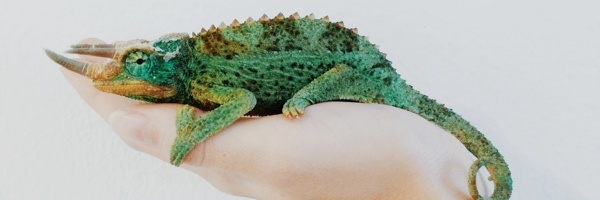You’ll see videos of animals being attentive and helpful to people in need within moments of clicking on to social media. In addition to being adorable, these videos are a reminder of how important animals are in our own lives.
Many different types of animals have been shown to provide comfort and health benefits to people with lupus including:
- Cats
- Dogs
- Horses
- Lizards
- Birds
- Rabbits
- Alpacas
- Guinea pigs
Animals are ideal companions because they are able to sense physical cues associated with pain or stress, such as slight changes in scent or body language. Petting animals is well-known to lower blood pressure and lower the perception of pain. It even has an impact at the neurochemical level.
Having a pet can make it less lonely when a lupus flare keeps you at home. And, the chores associated with pets such as walking, feeding, or grooming add positive motivation to get exercise and do activities throughout the day.
The benefits that animals provide to humans is well studied. However, pet ownership comes with some risks for people with lupus.

Are Pets Safe for People With lupus?
Allergies, disease, and injuries are the main concerns for people with lupus. Doctors and veterinarians alike recommend that people with lupus avoid exotic animals and birds, which cannot be fully vaccinated and may pass on infections to humans.
In general, if pets are well-vaccinated, well-trained, healthy, and clean, there are few health-related problems with bringing one into the home.
The other concern is being able to take proper care of the animal. There is an obligation to the pet to keep them healthy, happy, exercised, and clean. This can be costly both in money and in energy. Be mindful of what you can handle when considering a pet.
For example, young or energetic animals (think: puppies and kittens) require nighttime trips to the restroom, training, and a lot of playtime in general throughout the day. Older animals are generally calmer but can have health issues or behavior problems that require care and attention.
Unsure of adding the responsibilities of pet ownership? Animal therapy is a good alternative way to get your dose of pet-time without the stress.

What is Animal Assisted therapy?
Animal-assisted therapy is a program to help patients with mental, physical, and behavioral difficulties. Many rehabilitation centers and hospitals have programs or service animals present. Therapy animals are trained to be friendly, affectionate, gentle, and attentive to the needs of people. Therapy animals can be any type of animal, and they are a great comfort in times of stress.
The therapy animals are typically not the patient’s own pet, but this can actually be beneficial since it removes the stress of pet care from the whole situation.
Because animal-assisted therapy is supervised and involves well-trained, well-handled, and medically up-to-date animals, it is usually safe for people with lupus. Allergies are still an issue, so make sure to let the animal therapy program know so that they bring the right animal therapist for you.

Tips for Pet Care with Lupus
Pet ownership is challenging but rewarding, and people with lupus can definitely have a pet. A few tips:
- Make sure that there is enough space for the animal, as well as the right toys and accessories. Ask your veterinarian or pet store about cat trees, chew toys, treats, and other things appropriate to your pet. Of course, a simple cardboard box and crinkly paper may be enough for some animals.
- Regular trips to the veterinarian are also essential to keeping both pet and owner disease-free. Don’t skip these visits if you can help it. Fortunately, some clinics make house calls, and this can be a good option for people with lupus.
Small animals that require low levels of maintenance, including cats and small dogs, are a good fit for people with lupus. Animals that live in cages and aquariums don’t need walks, so fish, mice, domestic rats, hamsters, or guinea pigs can make great pets for people with lupus. These pets need very basic feeding, cleaning, and socializing, and can be very rewarding to care for.

When finding the right pet for you, consider how you would handle fluctuations in lupus disease activity. Work with your family, partner, roommates, and friends to identify support networks (for your pet and for you!). A pet-support team can take the stress out of pet ownership. That way, you can focus on the joy that pets bring to your life.
Not sure about a pet? There are many ways to reduce stress. Read here about other ways that you can manage stress, take care of your gut health, and get on a healthy sleep schedule.
12 thoughts on “Pets, Health Benefits of Animals, & Lupus”
Leave a Reply
Mental Health, Flares, and Lupus
Mental health problems are very common symptoms of lupus, and can get worse during...
Cold Weather, Symptom Flares, and Lupus
Cold weather can bring lupus flares with it, but the reasons behind these flares...
Skin Bacteria, Infections, and Lupus Flares
Skin Bacteria, Infections, and Lupus Flares: What’s the Relationship? Lupus disrupts the microbes on the...
There are times I would never get out of bed from the pain. But my pets need me so I get up.
They give me the strength to keep going when I am alone. They seem to know when I am at my worse and they come to me and know weather I need to pet them or they just need to be near me. I recommend a pet to any person going through issues. They will help.
I agree 100%! I love my dog, he goes everywhere with me.
I totally agree. My 2 cats know when I’m feeling worse and they give me much comfort
I totally agree. My 2 cats know when I’m feeling worse and they give me much comfort
I have a service dog. She is my rock. She knows when I’m sick and will stay by my side.
After I had to give up work I got a lab x bearded collie mix puppy for company at home. She is smart and sweet and loving. I call her my nurse dog because she has such a keen sense of when I’m unwell or sad. She never leaves my side. When I fall (balance problems, thanks lupus) she wriggles underneath me and pushes upward, then stands so I can lean on her as I get up. I never taught her that. And she is always happy and ready for fun. That’s something I need to work on always, so lupus doesn’t win.
I really love to read your blog as well as the examples that you’ve mention. Thank you so much for this helpful contents. I am looking forward to see more example contents like this. petsmart hours
Thank you very much for reading! We appreciate the feedback.
I have been thinking of getting a dog as l am about to retire due to the progressive nature of lupus. I am really looking forward to getting a dog and came across this site.
Just wanted to say a big thank you for all the comments as it had cheered me up immensely.
Take care
I have two young cats and they sense when I’m not feeling well and will cuddle up next to me which makes me feel good. They are also good listeners.
I have had a kitty since I was 3 years old and am now 75 years old. I have also had lupus and epilepsy since I was 12 years old. My kitties have not only been a companion to me, they have also learned very quickly thow to warn me if I am going to have a seizure and then they stay with me during and after the seizure. Several times my kitties have figured out how to get help for me if I fall or otherwise get injured. I do not think I would even be alive without my kitty. One thing kitties do ise purr and this purr helps prevent my seizures. I had an incident when just last Dec. where my kittie actually saved my life by purring right next to me until a human being was around. Right after the humans were by me, my kittie stopped purring and I went into respiratory arrest. The doctors all told me that my kittie had kept me alive until help could come and that was for a long time. I love my kitties and they love me.
I have had a kitty since I was 3 years old and am now 75 years old. I have also had lupus and epilepsy since I was 12 years old. My kitties have not only been a companion to me, they have also learned very quickly thow to warn me if I am going to have a seizure and then they stay with me during and after the seizure. Several times my kitties have figured out how to get help for me if I fall or otherwise get injured. I do not think I would even be alive without my kitty. One thing kitties do ise purr and this purr helps prevent my seizures. I had an incident when just last Dec. where my kittie actually saved my life by purring right next to me until a human being was around. Right after the humans were by me, my kittie stoppred purrring and I went into respiratory arrest. The doctors all told me that my kittie had kept me alive until help could come and that was for a long time. I love my kitties and they love me.